An Analysis of Entrepreneurship: Types, Impact, and Environment
VerifiedAdded on 2023/02/02
|19
|6020
|61
Report
AI Summary
This report provides a detailed analysis of entrepreneurship, exploring various aspects of entrepreneurial ventures. It begins by defining entrepreneurship and identifying different types of ventures, including small businesses, lifestyle businesses, social enterprises, scalable startups, and large company entrepreneurship. The report compares these different types of entrepreneurs, highlighting their distinct characteristics and motivations. It then examines the significant impact of small businesses on the economy, emphasizing their role in economic growth and job creation. The report further delves into the social economy, discussing how small businesses contribute to financial independence and innovation. Additionally, it analyzes the key aspects of an entrepreneurial mindset, such as risk-taking, creativity, and perseverance, and discusses how various environments can either foster or hinder entrepreneurial activities. The report concludes by summarizing the key findings and providing an overview of the complex landscape of entrepreneurship.

Running head: AN ANALYSIS OF ENTREPRENEURSHIP
An Analysis of
Entrepreneurship
An Analysis of
Entrepreneurship
Paraphrase This Document
Need a fresh take? Get an instant paraphrase of this document with our AI Paraphraser
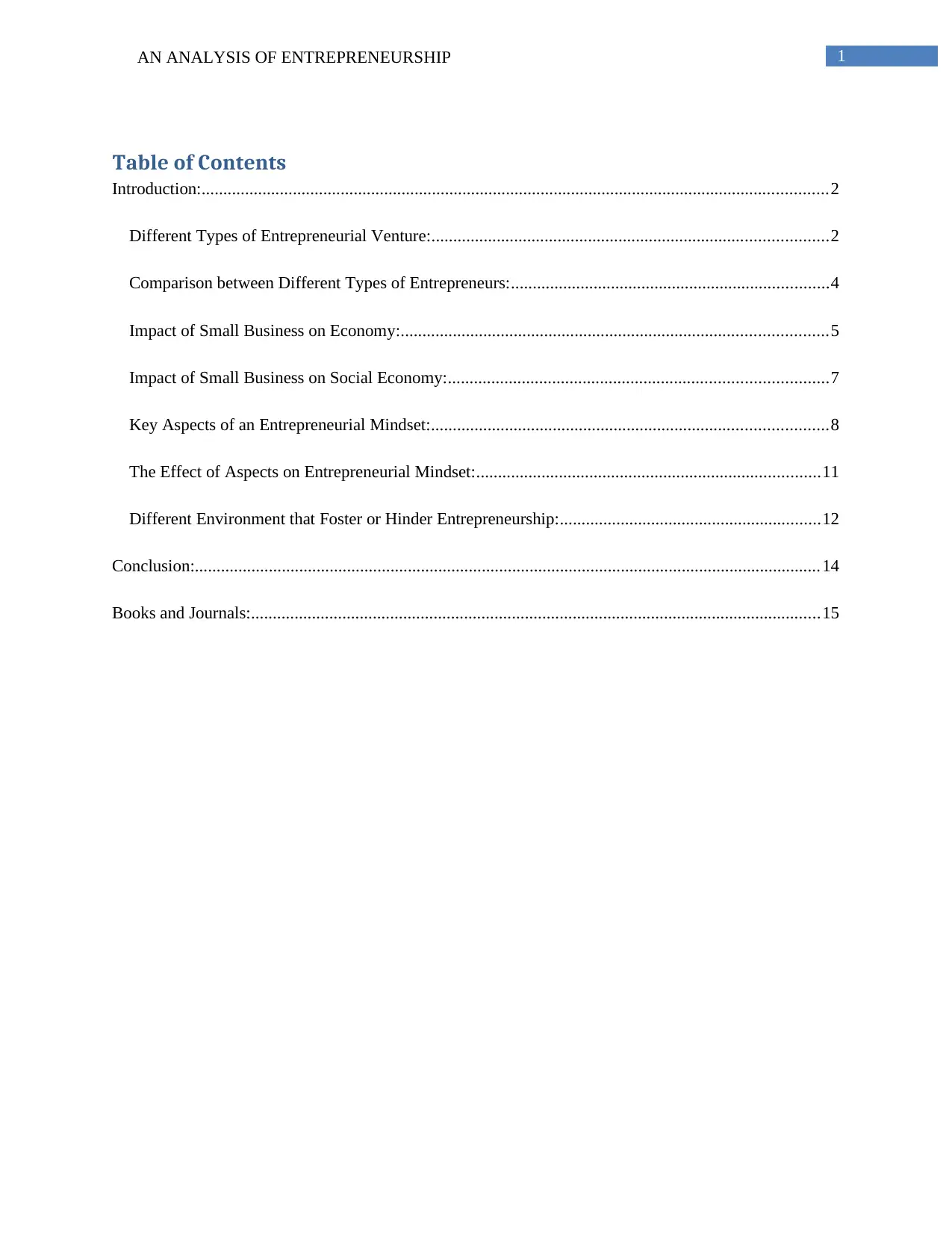
1AN ANALYSIS OF ENTREPRENEURSHIP
Table of Contents
Introduction:................................................................................................................................................2
Different Types of Entrepreneurial Venture:...........................................................................................2
Comparison between Different Types of Entrepreneurs:.........................................................................4
Impact of Small Business on Economy:..................................................................................................5
Impact of Small Business on Social Economy:.......................................................................................7
Key Aspects of an Entrepreneurial Mindset:...........................................................................................8
The Effect of Aspects on Entrepreneurial Mindset:...............................................................................11
Different Environment that Foster or Hinder Entrepreneurship:............................................................12
Conclusion:................................................................................................................................................14
Books and Journals:...................................................................................................................................15
Table of Contents
Introduction:................................................................................................................................................2
Different Types of Entrepreneurial Venture:...........................................................................................2
Comparison between Different Types of Entrepreneurs:.........................................................................4
Impact of Small Business on Economy:..................................................................................................5
Impact of Small Business on Social Economy:.......................................................................................7
Key Aspects of an Entrepreneurial Mindset:...........................................................................................8
The Effect of Aspects on Entrepreneurial Mindset:...............................................................................11
Different Environment that Foster or Hinder Entrepreneurship:............................................................12
Conclusion:................................................................................................................................................14
Books and Journals:...................................................................................................................................15
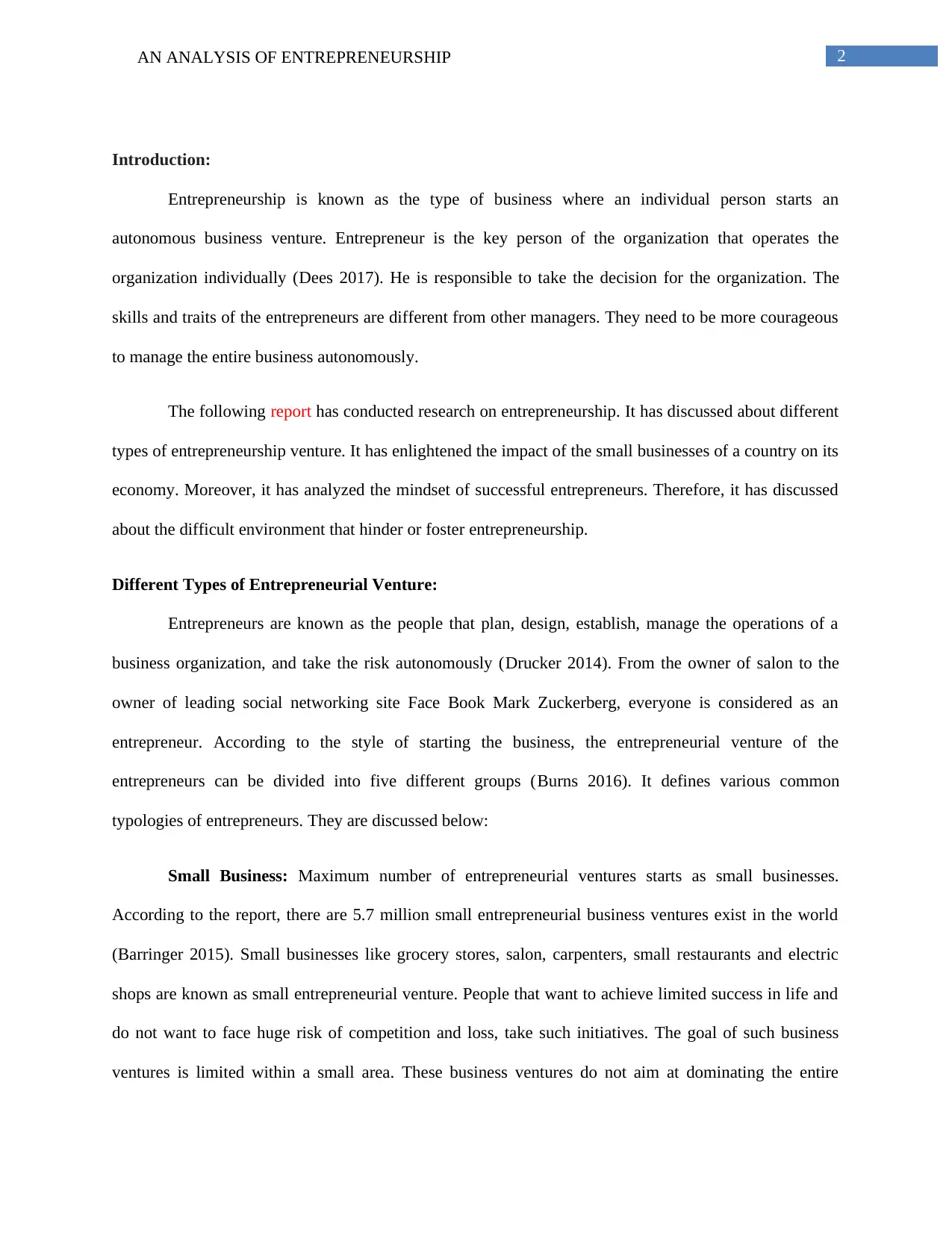
2AN ANALYSIS OF ENTREPRENEURSHIP
Introduction:
Entrepreneurship is known as the type of business where an individual person starts an
autonomous business venture. Entrepreneur is the key person of the organization that operates the
organization individually (Dees 2017). He is responsible to take the decision for the organization. The
skills and traits of the entrepreneurs are different from other managers. They need to be more courageous
to manage the entire business autonomously.
The following report has conducted research on entrepreneurship. It has discussed about different
types of entrepreneurship venture. It has enlightened the impact of the small businesses of a country on its
economy. Moreover, it has analyzed the mindset of successful entrepreneurs. Therefore, it has discussed
about the difficult environment that hinder or foster entrepreneurship.
Different Types of Entrepreneurial Venture:
Entrepreneurs are known as the people that plan, design, establish, manage the operations of a
business organization, and take the risk autonomously (Drucker 2014). From the owner of salon to the
owner of leading social networking site Face Book Mark Zuckerberg, everyone is considered as an
entrepreneur. According to the style of starting the business, the entrepreneurial venture of the
entrepreneurs can be divided into five different groups (Burns 2016). It defines various common
typologies of entrepreneurs. They are discussed below:
Small Business: Maximum number of entrepreneurial ventures starts as small businesses.
According to the report, there are 5.7 million small entrepreneurial business ventures exist in the world
(Barringer 2015). Small businesses like grocery stores, salon, carpenters, small restaurants and electric
shops are known as small entrepreneurial venture. People that want to achieve limited success in life and
do not want to face huge risk of competition and loss, take such initiatives. The goal of such business
ventures is limited within a small area. These business ventures do not aim at dominating the entire
Introduction:
Entrepreneurship is known as the type of business where an individual person starts an
autonomous business venture. Entrepreneur is the key person of the organization that operates the
organization individually (Dees 2017). He is responsible to take the decision for the organization. The
skills and traits of the entrepreneurs are different from other managers. They need to be more courageous
to manage the entire business autonomously.
The following report has conducted research on entrepreneurship. It has discussed about different
types of entrepreneurship venture. It has enlightened the impact of the small businesses of a country on its
economy. Moreover, it has analyzed the mindset of successful entrepreneurs. Therefore, it has discussed
about the difficult environment that hinder or foster entrepreneurship.
Different Types of Entrepreneurial Venture:
Entrepreneurs are known as the people that plan, design, establish, manage the operations of a
business organization, and take the risk autonomously (Drucker 2014). From the owner of salon to the
owner of leading social networking site Face Book Mark Zuckerberg, everyone is considered as an
entrepreneur. According to the style of starting the business, the entrepreneurial venture of the
entrepreneurs can be divided into five different groups (Burns 2016). It defines various common
typologies of entrepreneurs. They are discussed below:
Small Business: Maximum number of entrepreneurial ventures starts as small businesses.
According to the report, there are 5.7 million small entrepreneurial business ventures exist in the world
(Barringer 2015). Small businesses like grocery stores, salon, carpenters, small restaurants and electric
shops are known as small entrepreneurial venture. People that want to achieve limited success in life and
do not want to face huge risk of competition and loss, take such initiatives. The goal of such business
ventures is limited within a small area. These business ventures do not aim at dominating the entire
⊘ This is a preview!⊘
Do you want full access?
Subscribe today to unlock all pages.

Trusted by 1+ million students worldwide
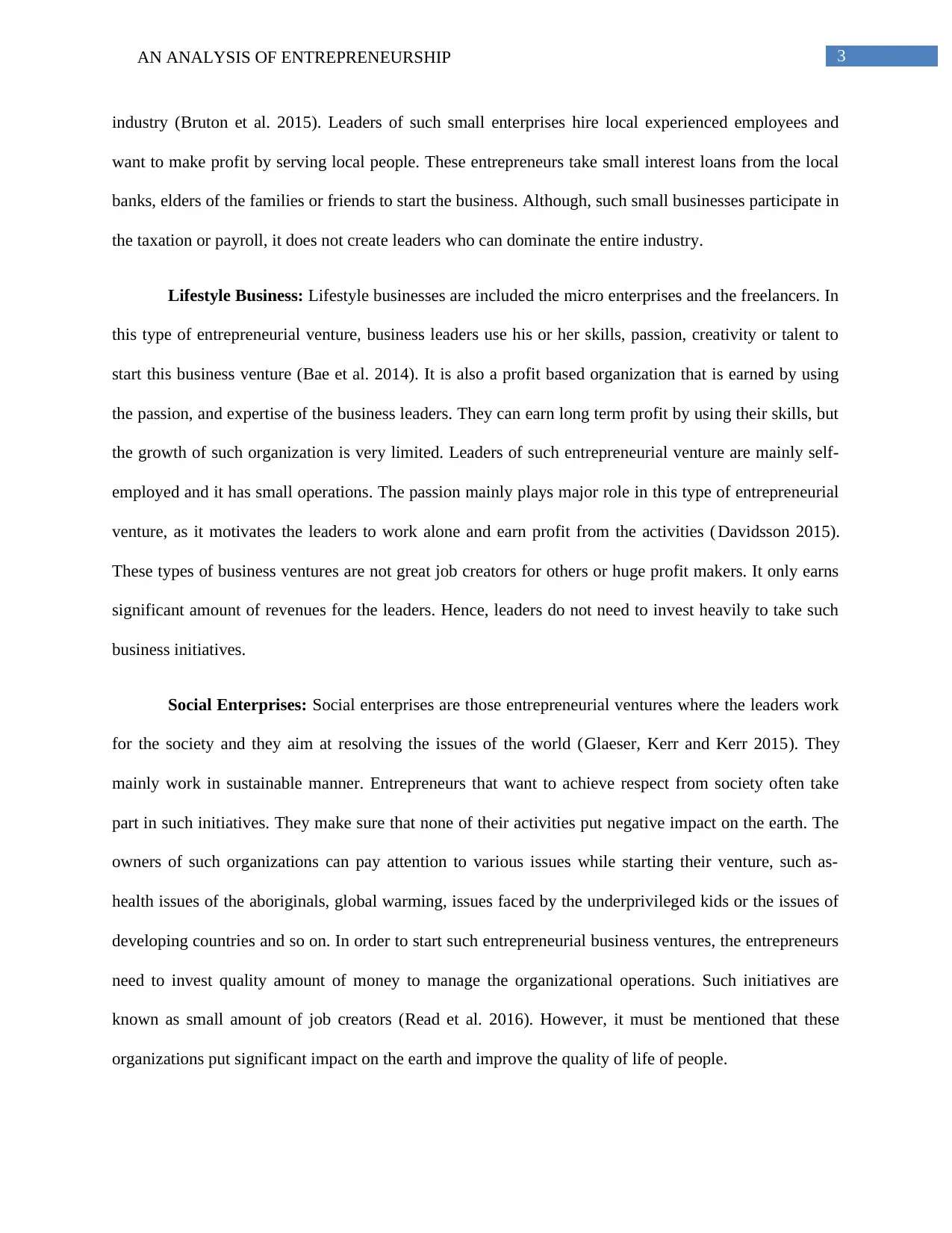
3AN ANALYSIS OF ENTREPRENEURSHIP
industry (Bruton et al. 2015). Leaders of such small enterprises hire local experienced employees and
want to make profit by serving local people. These entrepreneurs take small interest loans from the local
banks, elders of the families or friends to start the business. Although, such small businesses participate in
the taxation or payroll, it does not create leaders who can dominate the entire industry.
Lifestyle Business: Lifestyle businesses are included the micro enterprises and the freelancers. In
this type of entrepreneurial venture, business leaders use his or her skills, passion, creativity or talent to
start this business venture (Bae et al. 2014). It is also a profit based organization that is earned by using
the passion, and expertise of the business leaders. They can earn long term profit by using their skills, but
the growth of such organization is very limited. Leaders of such entrepreneurial venture are mainly self-
employed and it has small operations. The passion mainly plays major role in this type of entrepreneurial
venture, as it motivates the leaders to work alone and earn profit from the activities ( Davidsson 2015).
These types of business ventures are not great job creators for others or huge profit makers. It only earns
significant amount of revenues for the leaders. Hence, leaders do not need to invest heavily to take such
business initiatives.
Social Enterprises: Social enterprises are those entrepreneurial ventures where the leaders work
for the society and they aim at resolving the issues of the world (Glaeser, Kerr and Kerr 2015). They
mainly work in sustainable manner. Entrepreneurs that want to achieve respect from society often take
part in such initiatives. They make sure that none of their activities put negative impact on the earth. The
owners of such organizations can pay attention to various issues while starting their venture, such as-
health issues of the aboriginals, global warming, issues faced by the underprivileged kids or the issues of
developing countries and so on. In order to start such entrepreneurial business ventures, the entrepreneurs
need to invest quality amount of money to manage the organizational operations. Such initiatives are
known as small amount of job creators (Read et al. 2016). However, it must be mentioned that these
organizations put significant impact on the earth and improve the quality of life of people.
industry (Bruton et al. 2015). Leaders of such small enterprises hire local experienced employees and
want to make profit by serving local people. These entrepreneurs take small interest loans from the local
banks, elders of the families or friends to start the business. Although, such small businesses participate in
the taxation or payroll, it does not create leaders who can dominate the entire industry.
Lifestyle Business: Lifestyle businesses are included the micro enterprises and the freelancers. In
this type of entrepreneurial venture, business leaders use his or her skills, passion, creativity or talent to
start this business venture (Bae et al. 2014). It is also a profit based organization that is earned by using
the passion, and expertise of the business leaders. They can earn long term profit by using their skills, but
the growth of such organization is very limited. Leaders of such entrepreneurial venture are mainly self-
employed and it has small operations. The passion mainly plays major role in this type of entrepreneurial
venture, as it motivates the leaders to work alone and earn profit from the activities ( Davidsson 2015).
These types of business ventures are not great job creators for others or huge profit makers. It only earns
significant amount of revenues for the leaders. Hence, leaders do not need to invest heavily to take such
business initiatives.
Social Enterprises: Social enterprises are those entrepreneurial ventures where the leaders work
for the society and they aim at resolving the issues of the world (Glaeser, Kerr and Kerr 2015). They
mainly work in sustainable manner. Entrepreneurs that want to achieve respect from society often take
part in such initiatives. They make sure that none of their activities put negative impact on the earth. The
owners of such organizations can pay attention to various issues while starting their venture, such as-
health issues of the aboriginals, global warming, issues faced by the underprivileged kids or the issues of
developing countries and so on. In order to start such entrepreneurial business ventures, the entrepreneurs
need to invest quality amount of money to manage the organizational operations. Such initiatives are
known as small amount of job creators (Read et al. 2016). However, it must be mentioned that these
organizations put significant impact on the earth and improve the quality of life of people.
Paraphrase This Document
Need a fresh take? Get an instant paraphrase of this document with our AI Paraphraser
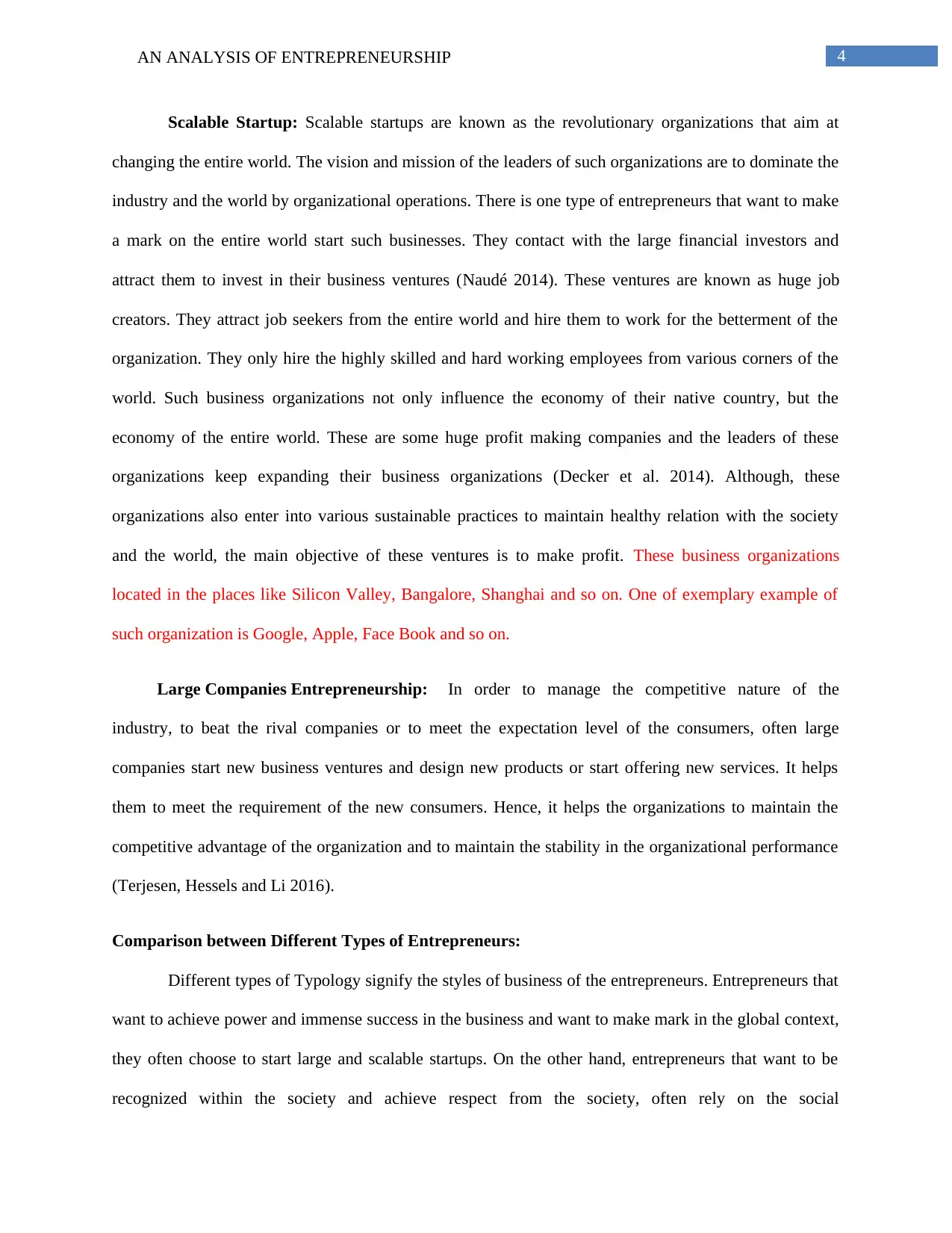
4AN ANALYSIS OF ENTREPRENEURSHIP
Scalable Startup: Scalable startups are known as the revolutionary organizations that aim at
changing the entire world. The vision and mission of the leaders of such organizations are to dominate the
industry and the world by organizational operations. There is one type of entrepreneurs that want to make
a mark on the entire world start such businesses. They contact with the large financial investors and
attract them to invest in their business ventures (Naudé 2014). These ventures are known as huge job
creators. They attract job seekers from the entire world and hire them to work for the betterment of the
organization. They only hire the highly skilled and hard working employees from various corners of the
world. Such business organizations not only influence the economy of their native country, but the
economy of the entire world. These are some huge profit making companies and the leaders of these
organizations keep expanding their business organizations (Decker et al. 2014). Although, these
organizations also enter into various sustainable practices to maintain healthy relation with the society
and the world, the main objective of these ventures is to make profit. These business organizations
located in the places like Silicon Valley, Bangalore, Shanghai and so on. One of exemplary example of
such organization is Google, Apple, Face Book and so on.
Large Companies Entrepreneurship: In order to manage the competitive nature of the
industry, to beat the rival companies or to meet the expectation level of the consumers, often large
companies start new business ventures and design new products or start offering new services. It helps
them to meet the requirement of the new consumers. Hence, it helps the organizations to maintain the
competitive advantage of the organization and to maintain the stability in the organizational performance
(Terjesen, Hessels and Li 2016).
Comparison between Different Types of Entrepreneurs:
Different types of Typology signify the styles of business of the entrepreneurs. Entrepreneurs that
want to achieve power and immense success in the business and want to make mark in the global context,
they often choose to start large and scalable startups. On the other hand, entrepreneurs that want to be
recognized within the society and achieve respect from the society, often rely on the social
Scalable Startup: Scalable startups are known as the revolutionary organizations that aim at
changing the entire world. The vision and mission of the leaders of such organizations are to dominate the
industry and the world by organizational operations. There is one type of entrepreneurs that want to make
a mark on the entire world start such businesses. They contact with the large financial investors and
attract them to invest in their business ventures (Naudé 2014). These ventures are known as huge job
creators. They attract job seekers from the entire world and hire them to work for the betterment of the
organization. They only hire the highly skilled and hard working employees from various corners of the
world. Such business organizations not only influence the economy of their native country, but the
economy of the entire world. These are some huge profit making companies and the leaders of these
organizations keep expanding their business organizations (Decker et al. 2014). Although, these
organizations also enter into various sustainable practices to maintain healthy relation with the society
and the world, the main objective of these ventures is to make profit. These business organizations
located in the places like Silicon Valley, Bangalore, Shanghai and so on. One of exemplary example of
such organization is Google, Apple, Face Book and so on.
Large Companies Entrepreneurship: In order to manage the competitive nature of the
industry, to beat the rival companies or to meet the expectation level of the consumers, often large
companies start new business ventures and design new products or start offering new services. It helps
them to meet the requirement of the new consumers. Hence, it helps the organizations to maintain the
competitive advantage of the organization and to maintain the stability in the organizational performance
(Terjesen, Hessels and Li 2016).
Comparison between Different Types of Entrepreneurs:
Different types of Typology signify the styles of business of the entrepreneurs. Entrepreneurs that
want to achieve power and immense success in the business and want to make mark in the global context,
they often choose to start large and scalable startups. On the other hand, entrepreneurs that want to be
recognized within the society and achieve respect from the society, often rely on the social
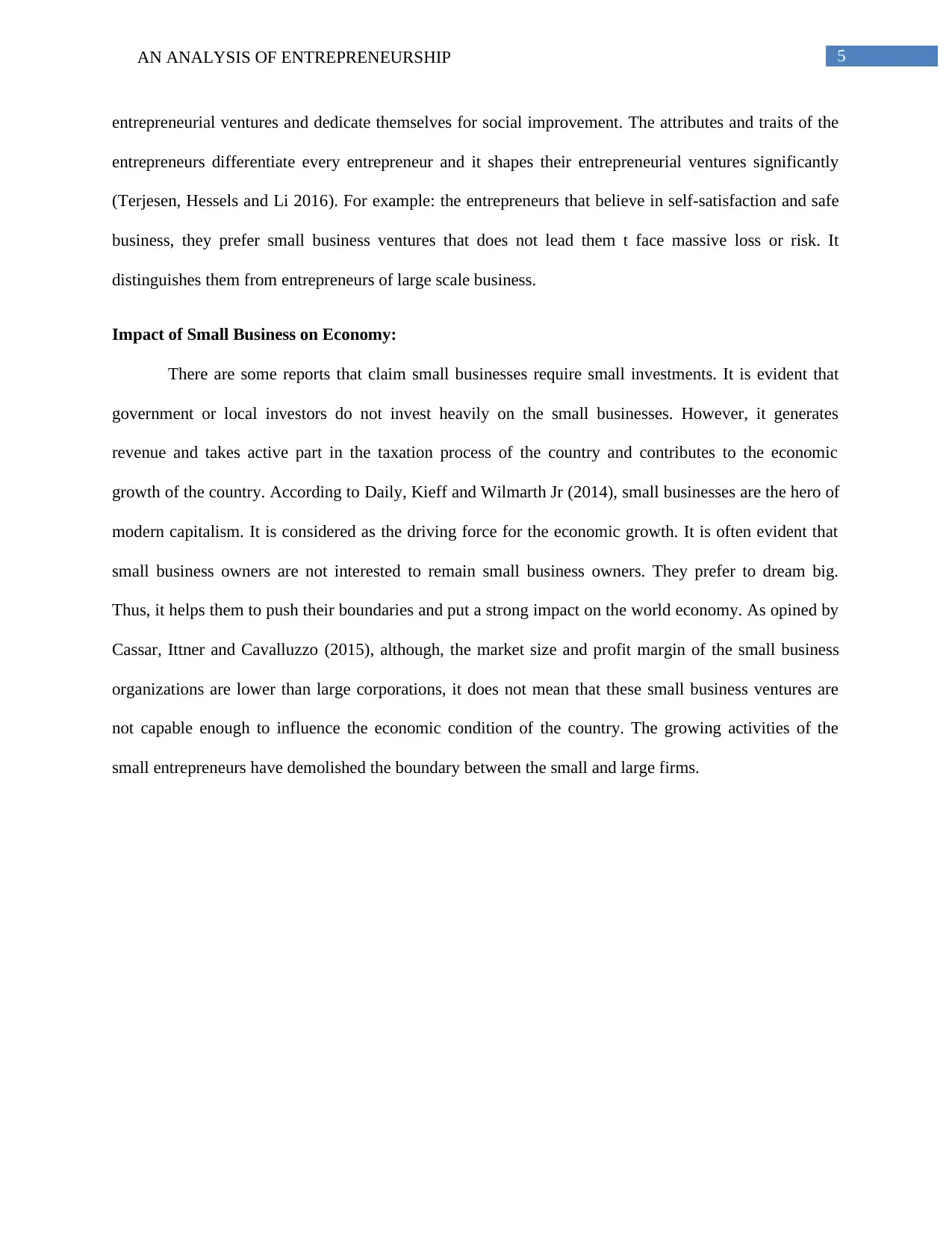
5AN ANALYSIS OF ENTREPRENEURSHIP
entrepreneurial ventures and dedicate themselves for social improvement. The attributes and traits of the
entrepreneurs differentiate every entrepreneur and it shapes their entrepreneurial ventures significantly
(Terjesen, Hessels and Li 2016). For example: the entrepreneurs that believe in self-satisfaction and safe
business, they prefer small business ventures that does not lead them t face massive loss or risk. It
distinguishes them from entrepreneurs of large scale business.
Impact of Small Business on Economy:
There are some reports that claim small businesses require small investments. It is evident that
government or local investors do not invest heavily on the small businesses. However, it generates
revenue and takes active part in the taxation process of the country and contributes to the economic
growth of the country. According to Daily, Kieff and Wilmarth Jr (2014), small businesses are the hero of
modern capitalism. It is considered as the driving force for the economic growth. It is often evident that
small business owners are not interested to remain small business owners. They prefer to dream big.
Thus, it helps them to push their boundaries and put a strong impact on the world economy. As opined by
Cassar, Ittner and Cavalluzzo (2015), although, the market size and profit margin of the small business
organizations are lower than large corporations, it does not mean that these small business ventures are
not capable enough to influence the economic condition of the country. The growing activities of the
small entrepreneurs have demolished the boundary between the small and large firms.
entrepreneurial ventures and dedicate themselves for social improvement. The attributes and traits of the
entrepreneurs differentiate every entrepreneur and it shapes their entrepreneurial ventures significantly
(Terjesen, Hessels and Li 2016). For example: the entrepreneurs that believe in self-satisfaction and safe
business, they prefer small business ventures that does not lead them t face massive loss or risk. It
distinguishes them from entrepreneurs of large scale business.
Impact of Small Business on Economy:
There are some reports that claim small businesses require small investments. It is evident that
government or local investors do not invest heavily on the small businesses. However, it generates
revenue and takes active part in the taxation process of the country and contributes to the economic
growth of the country. According to Daily, Kieff and Wilmarth Jr (2014), small businesses are the hero of
modern capitalism. It is considered as the driving force for the economic growth. It is often evident that
small business owners are not interested to remain small business owners. They prefer to dream big.
Thus, it helps them to push their boundaries and put a strong impact on the world economy. As opined by
Cassar, Ittner and Cavalluzzo (2015), although, the market size and profit margin of the small business
organizations are lower than large corporations, it does not mean that these small business ventures are
not capable enough to influence the economic condition of the country. The growing activities of the
small entrepreneurs have demolished the boundary between the small and large firms.
⊘ This is a preview!⊘
Do you want full access?
Subscribe today to unlock all pages.

Trusted by 1+ million students worldwide
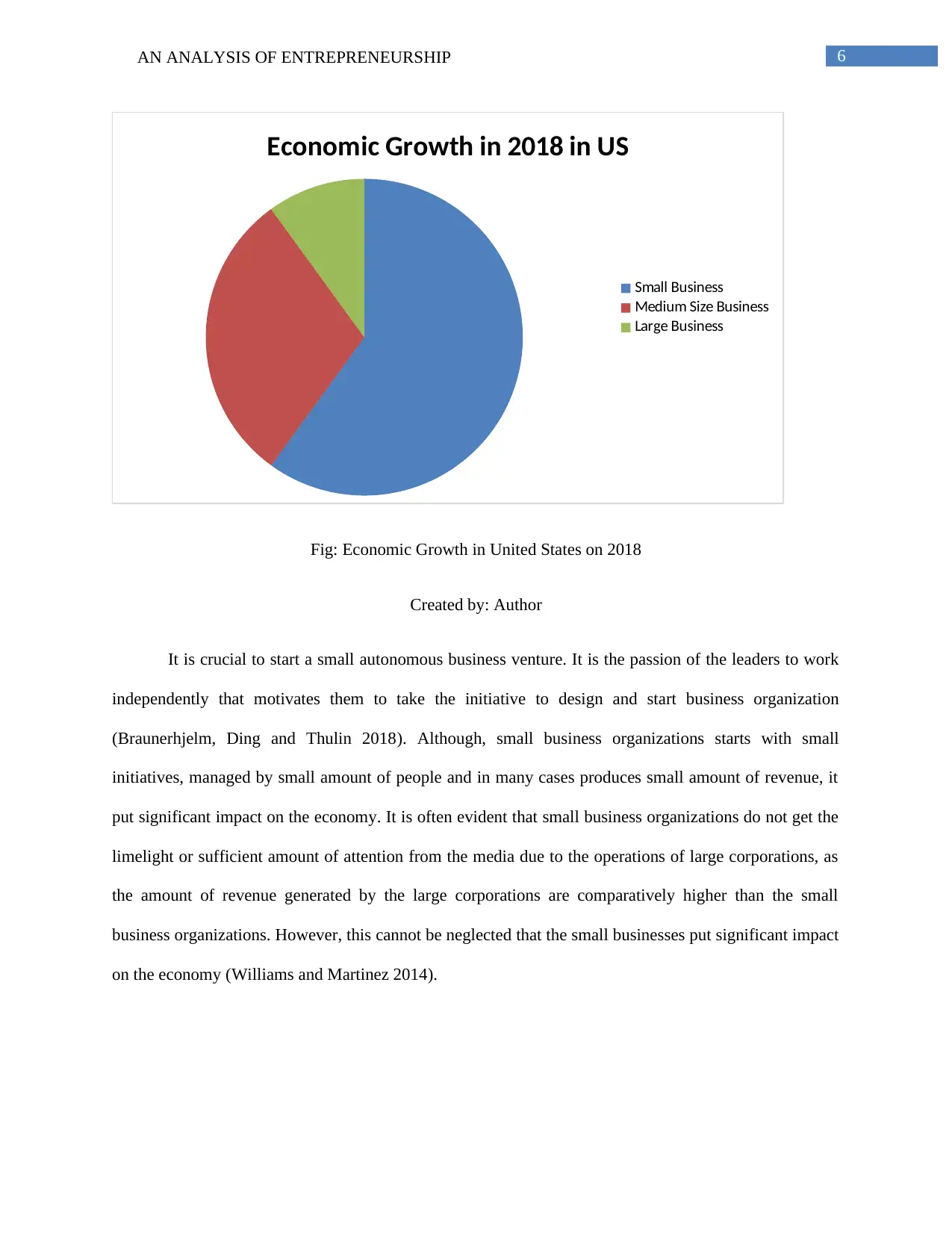
6AN ANALYSIS OF ENTREPRENEURSHIP
Economic Growth in 2018 in US
Small Business
Medium Size Business
Large Business
Fig: Economic Growth in United States on 2018
Created by: Author
It is crucial to start a small autonomous business venture. It is the passion of the leaders to work
independently that motivates them to take the initiative to design and start business organization
(Braunerhjelm, Ding and Thulin 2018). Although, small business organizations starts with small
initiatives, managed by small amount of people and in many cases produces small amount of revenue, it
put significant impact on the economy. It is often evident that small business organizations do not get the
limelight or sufficient amount of attention from the media due to the operations of large corporations, as
the amount of revenue generated by the large corporations are comparatively higher than the small
business organizations. However, this cannot be neglected that the small businesses put significant impact
on the economy (Williams and Martinez 2014).
Economic Growth in 2018 in US
Small Business
Medium Size Business
Large Business
Fig: Economic Growth in United States on 2018
Created by: Author
It is crucial to start a small autonomous business venture. It is the passion of the leaders to work
independently that motivates them to take the initiative to design and start business organization
(Braunerhjelm, Ding and Thulin 2018). Although, small business organizations starts with small
initiatives, managed by small amount of people and in many cases produces small amount of revenue, it
put significant impact on the economy. It is often evident that small business organizations do not get the
limelight or sufficient amount of attention from the media due to the operations of large corporations, as
the amount of revenue generated by the large corporations are comparatively higher than the small
business organizations. However, this cannot be neglected that the small businesses put significant impact
on the economy (Williams and Martinez 2014).
Paraphrase This Document
Need a fresh take? Get an instant paraphrase of this document with our AI Paraphraser
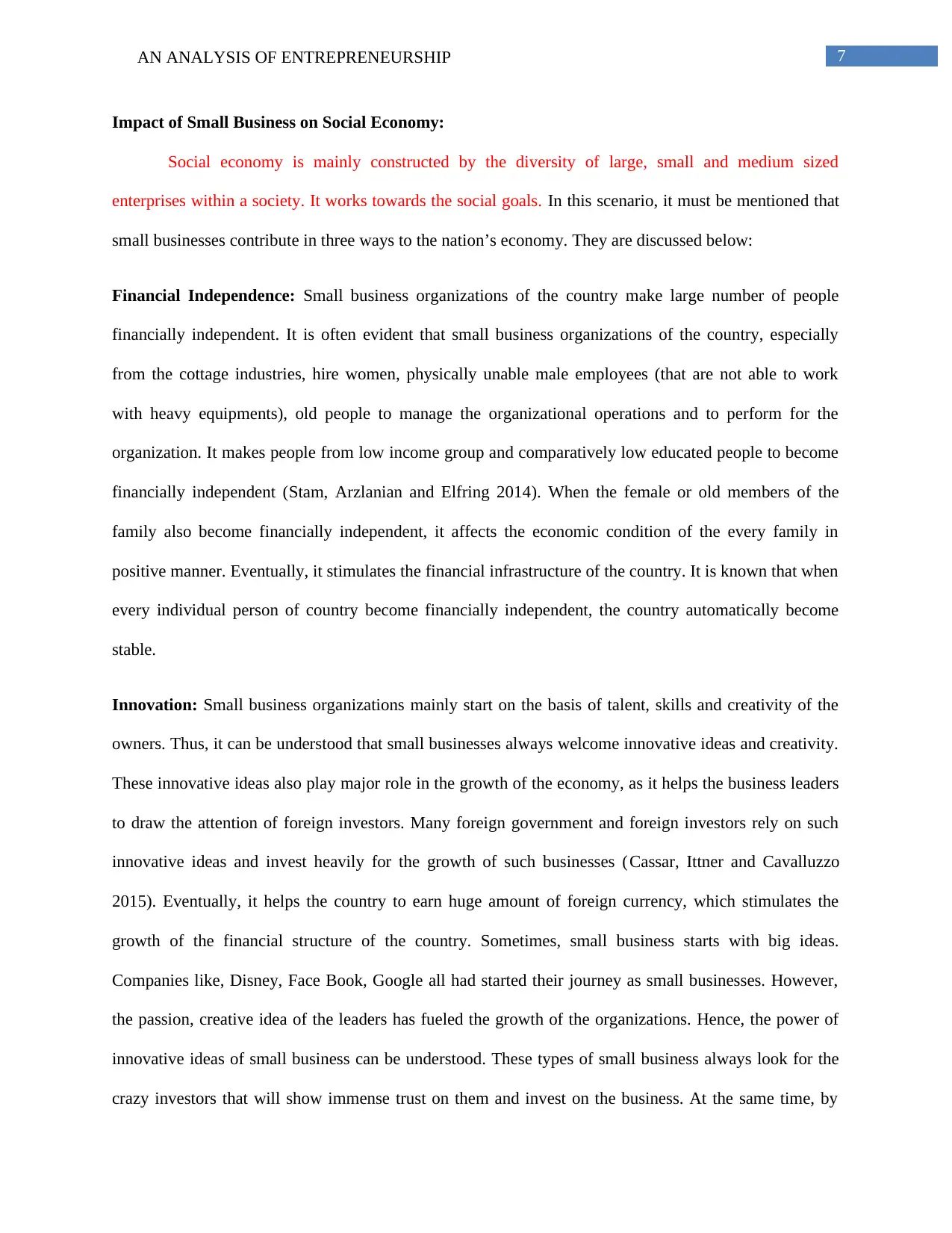
7AN ANALYSIS OF ENTREPRENEURSHIP
Impact of Small Business on Social Economy:
Social economy is mainly constructed by the diversity of large, small and medium sized
enterprises within a society. It works towards the social goals. In this scenario, it must be mentioned that
small businesses contribute in three ways to the nation’s economy. They are discussed below:
Financial Independence: Small business organizations of the country make large number of people
financially independent. It is often evident that small business organizations of the country, especially
from the cottage industries, hire women, physically unable male employees (that are not able to work
with heavy equipments), old people to manage the organizational operations and to perform for the
organization. It makes people from low income group and comparatively low educated people to become
financially independent (Stam, Arzlanian and Elfring 2014). When the female or old members of the
family also become financially independent, it affects the economic condition of the every family in
positive manner. Eventually, it stimulates the financial infrastructure of the country. It is known that when
every individual person of country become financially independent, the country automatically become
stable.
Innovation: Small business organizations mainly start on the basis of talent, skills and creativity of the
owners. Thus, it can be understood that small businesses always welcome innovative ideas and creativity.
These innovative ideas also play major role in the growth of the economy, as it helps the business leaders
to draw the attention of foreign investors. Many foreign government and foreign investors rely on such
innovative ideas and invest heavily for the growth of such businesses (Cassar, Ittner and Cavalluzzo
2015). Eventually, it helps the country to earn huge amount of foreign currency, which stimulates the
growth of the financial structure of the country. Sometimes, small business starts with big ideas.
Companies like, Disney, Face Book, Google all had started their journey as small businesses. However,
the passion, creative idea of the leaders has fueled the growth of the organizations. Hence, the power of
innovative ideas of small business can be understood. These types of small business always look for the
crazy investors that will show immense trust on them and invest on the business. At the same time, by
Impact of Small Business on Social Economy:
Social economy is mainly constructed by the diversity of large, small and medium sized
enterprises within a society. It works towards the social goals. In this scenario, it must be mentioned that
small businesses contribute in three ways to the nation’s economy. They are discussed below:
Financial Independence: Small business organizations of the country make large number of people
financially independent. It is often evident that small business organizations of the country, especially
from the cottage industries, hire women, physically unable male employees (that are not able to work
with heavy equipments), old people to manage the organizational operations and to perform for the
organization. It makes people from low income group and comparatively low educated people to become
financially independent (Stam, Arzlanian and Elfring 2014). When the female or old members of the
family also become financially independent, it affects the economic condition of the every family in
positive manner. Eventually, it stimulates the financial infrastructure of the country. It is known that when
every individual person of country become financially independent, the country automatically become
stable.
Innovation: Small business organizations mainly start on the basis of talent, skills and creativity of the
owners. Thus, it can be understood that small businesses always welcome innovative ideas and creativity.
These innovative ideas also play major role in the growth of the economy, as it helps the business leaders
to draw the attention of foreign investors. Many foreign government and foreign investors rely on such
innovative ideas and invest heavily for the growth of such businesses (Cassar, Ittner and Cavalluzzo
2015). Eventually, it helps the country to earn huge amount of foreign currency, which stimulates the
growth of the financial structure of the country. Sometimes, small business starts with big ideas.
Companies like, Disney, Face Book, Google all had started their journey as small businesses. However,
the passion, creative idea of the leaders has fueled the growth of the organizations. Hence, the power of
innovative ideas of small business can be understood. These types of small business always look for the
crazy investors that will show immense trust on them and invest on the business. At the same time, by
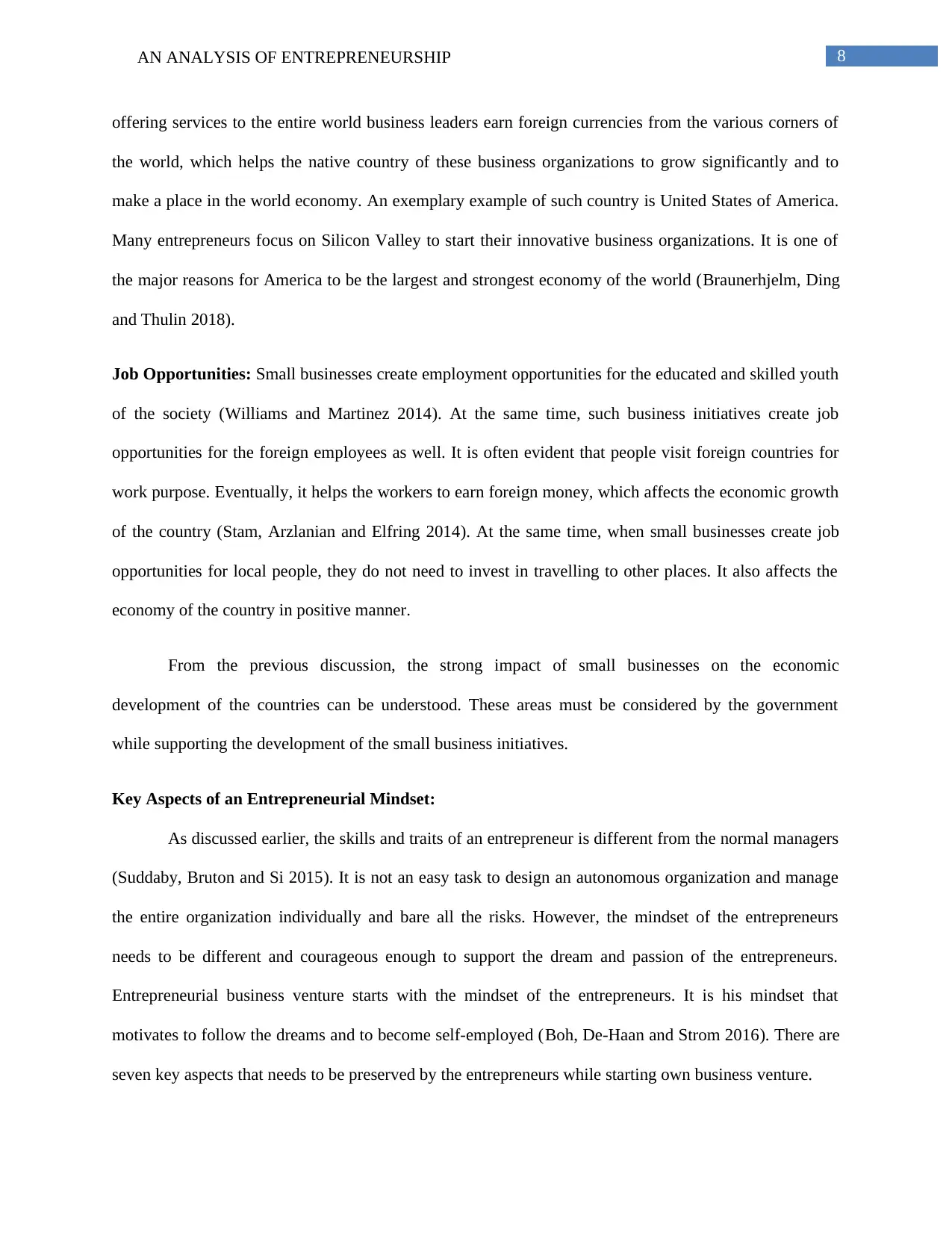
8AN ANALYSIS OF ENTREPRENEURSHIP
offering services to the entire world business leaders earn foreign currencies from the various corners of
the world, which helps the native country of these business organizations to grow significantly and to
make a place in the world economy. An exemplary example of such country is United States of America.
Many entrepreneurs focus on Silicon Valley to start their innovative business organizations. It is one of
the major reasons for America to be the largest and strongest economy of the world (Braunerhjelm, Ding
and Thulin 2018).
Job Opportunities: Small businesses create employment opportunities for the educated and skilled youth
of the society (Williams and Martinez 2014). At the same time, such business initiatives create job
opportunities for the foreign employees as well. It is often evident that people visit foreign countries for
work purpose. Eventually, it helps the workers to earn foreign money, which affects the economic growth
of the country (Stam, Arzlanian and Elfring 2014). At the same time, when small businesses create job
opportunities for local people, they do not need to invest in travelling to other places. It also affects the
economy of the country in positive manner.
From the previous discussion, the strong impact of small businesses on the economic
development of the countries can be understood. These areas must be considered by the government
while supporting the development of the small business initiatives.
Key Aspects of an Entrepreneurial Mindset:
As discussed earlier, the skills and traits of an entrepreneur is different from the normal managers
(Suddaby, Bruton and Si 2015). It is not an easy task to design an autonomous organization and manage
the entire organization individually and bare all the risks. However, the mindset of the entrepreneurs
needs to be different and courageous enough to support the dream and passion of the entrepreneurs.
Entrepreneurial business venture starts with the mindset of the entrepreneurs. It is his mindset that
motivates to follow the dreams and to become self-employed (Boh, De-Haan and Strom 2016). There are
seven key aspects that needs to be preserved by the entrepreneurs while starting own business venture.
offering services to the entire world business leaders earn foreign currencies from the various corners of
the world, which helps the native country of these business organizations to grow significantly and to
make a place in the world economy. An exemplary example of such country is United States of America.
Many entrepreneurs focus on Silicon Valley to start their innovative business organizations. It is one of
the major reasons for America to be the largest and strongest economy of the world (Braunerhjelm, Ding
and Thulin 2018).
Job Opportunities: Small businesses create employment opportunities for the educated and skilled youth
of the society (Williams and Martinez 2014). At the same time, such business initiatives create job
opportunities for the foreign employees as well. It is often evident that people visit foreign countries for
work purpose. Eventually, it helps the workers to earn foreign money, which affects the economic growth
of the country (Stam, Arzlanian and Elfring 2014). At the same time, when small businesses create job
opportunities for local people, they do not need to invest in travelling to other places. It also affects the
economy of the country in positive manner.
From the previous discussion, the strong impact of small businesses on the economic
development of the countries can be understood. These areas must be considered by the government
while supporting the development of the small business initiatives.
Key Aspects of an Entrepreneurial Mindset:
As discussed earlier, the skills and traits of an entrepreneur is different from the normal managers
(Suddaby, Bruton and Si 2015). It is not an easy task to design an autonomous organization and manage
the entire organization individually and bare all the risks. However, the mindset of the entrepreneurs
needs to be different and courageous enough to support the dream and passion of the entrepreneurs.
Entrepreneurial business venture starts with the mindset of the entrepreneurs. It is his mindset that
motivates to follow the dreams and to become self-employed (Boh, De-Haan and Strom 2016). There are
seven key aspects that needs to be preserved by the entrepreneurs while starting own business venture.
⊘ This is a preview!⊘
Do you want full access?
Subscribe today to unlock all pages.

Trusted by 1+ million students worldwide
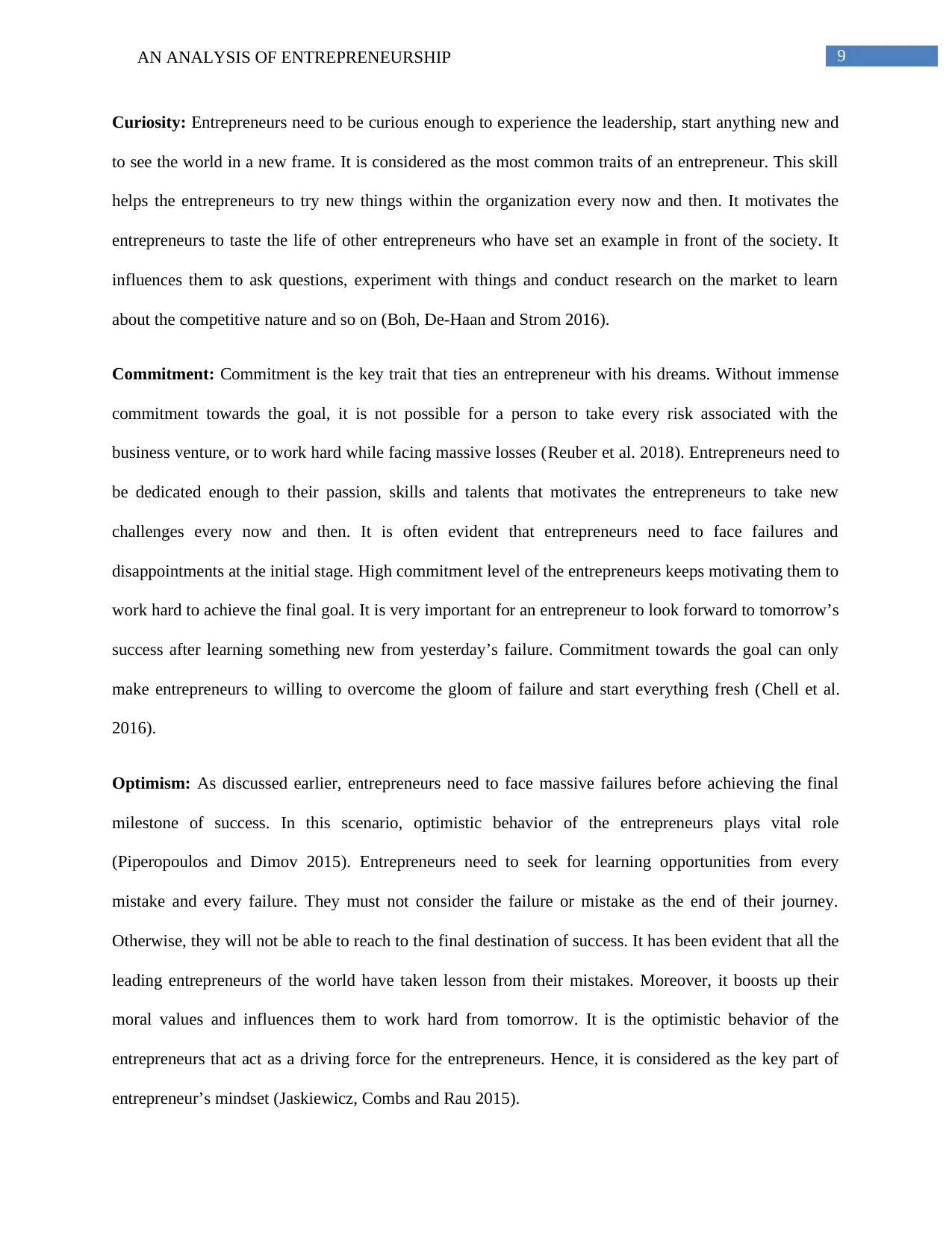
9AN ANALYSIS OF ENTREPRENEURSHIP
Curiosity: Entrepreneurs need to be curious enough to experience the leadership, start anything new and
to see the world in a new frame. It is considered as the most common traits of an entrepreneur. This skill
helps the entrepreneurs to try new things within the organization every now and then. It motivates the
entrepreneurs to taste the life of other entrepreneurs who have set an example in front of the society. It
influences them to ask questions, experiment with things and conduct research on the market to learn
about the competitive nature and so on (Boh, De-Haan and Strom 2016).
Commitment: Commitment is the key trait that ties an entrepreneur with his dreams. Without immense
commitment towards the goal, it is not possible for a person to take every risk associated with the
business venture, or to work hard while facing massive losses (Reuber et al. 2018). Entrepreneurs need to
be dedicated enough to their passion, skills and talents that motivates the entrepreneurs to take new
challenges every now and then. It is often evident that entrepreneurs need to face failures and
disappointments at the initial stage. High commitment level of the entrepreneurs keeps motivating them to
work hard to achieve the final goal. It is very important for an entrepreneur to look forward to tomorrow’s
success after learning something new from yesterday’s failure. Commitment towards the goal can only
make entrepreneurs to willing to overcome the gloom of failure and start everything fresh (Chell et al.
2016).
Optimism: As discussed earlier, entrepreneurs need to face massive failures before achieving the final
milestone of success. In this scenario, optimistic behavior of the entrepreneurs plays vital role
(Piperopoulos and Dimov 2015). Entrepreneurs need to seek for learning opportunities from every
mistake and every failure. They must not consider the failure or mistake as the end of their journey.
Otherwise, they will not be able to reach to the final destination of success. It has been evident that all the
leading entrepreneurs of the world have taken lesson from their mistakes. Moreover, it boosts up their
moral values and influences them to work hard from tomorrow. It is the optimistic behavior of the
entrepreneurs that act as a driving force for the entrepreneurs. Hence, it is considered as the key part of
entrepreneur’s mindset (Jaskiewicz, Combs and Rau 2015).
Curiosity: Entrepreneurs need to be curious enough to experience the leadership, start anything new and
to see the world in a new frame. It is considered as the most common traits of an entrepreneur. This skill
helps the entrepreneurs to try new things within the organization every now and then. It motivates the
entrepreneurs to taste the life of other entrepreneurs who have set an example in front of the society. It
influences them to ask questions, experiment with things and conduct research on the market to learn
about the competitive nature and so on (Boh, De-Haan and Strom 2016).
Commitment: Commitment is the key trait that ties an entrepreneur with his dreams. Without immense
commitment towards the goal, it is not possible for a person to take every risk associated with the
business venture, or to work hard while facing massive losses (Reuber et al. 2018). Entrepreneurs need to
be dedicated enough to their passion, skills and talents that motivates the entrepreneurs to take new
challenges every now and then. It is often evident that entrepreneurs need to face failures and
disappointments at the initial stage. High commitment level of the entrepreneurs keeps motivating them to
work hard to achieve the final goal. It is very important for an entrepreneur to look forward to tomorrow’s
success after learning something new from yesterday’s failure. Commitment towards the goal can only
make entrepreneurs to willing to overcome the gloom of failure and start everything fresh (Chell et al.
2016).
Optimism: As discussed earlier, entrepreneurs need to face massive failures before achieving the final
milestone of success. In this scenario, optimistic behavior of the entrepreneurs plays vital role
(Piperopoulos and Dimov 2015). Entrepreneurs need to seek for learning opportunities from every
mistake and every failure. They must not consider the failure or mistake as the end of their journey.
Otherwise, they will not be able to reach to the final destination of success. It has been evident that all the
leading entrepreneurs of the world have taken lesson from their mistakes. Moreover, it boosts up their
moral values and influences them to work hard from tomorrow. It is the optimistic behavior of the
entrepreneurs that act as a driving force for the entrepreneurs. Hence, it is considered as the key part of
entrepreneur’s mindset (Jaskiewicz, Combs and Rau 2015).
Paraphrase This Document
Need a fresh take? Get an instant paraphrase of this document with our AI Paraphraser
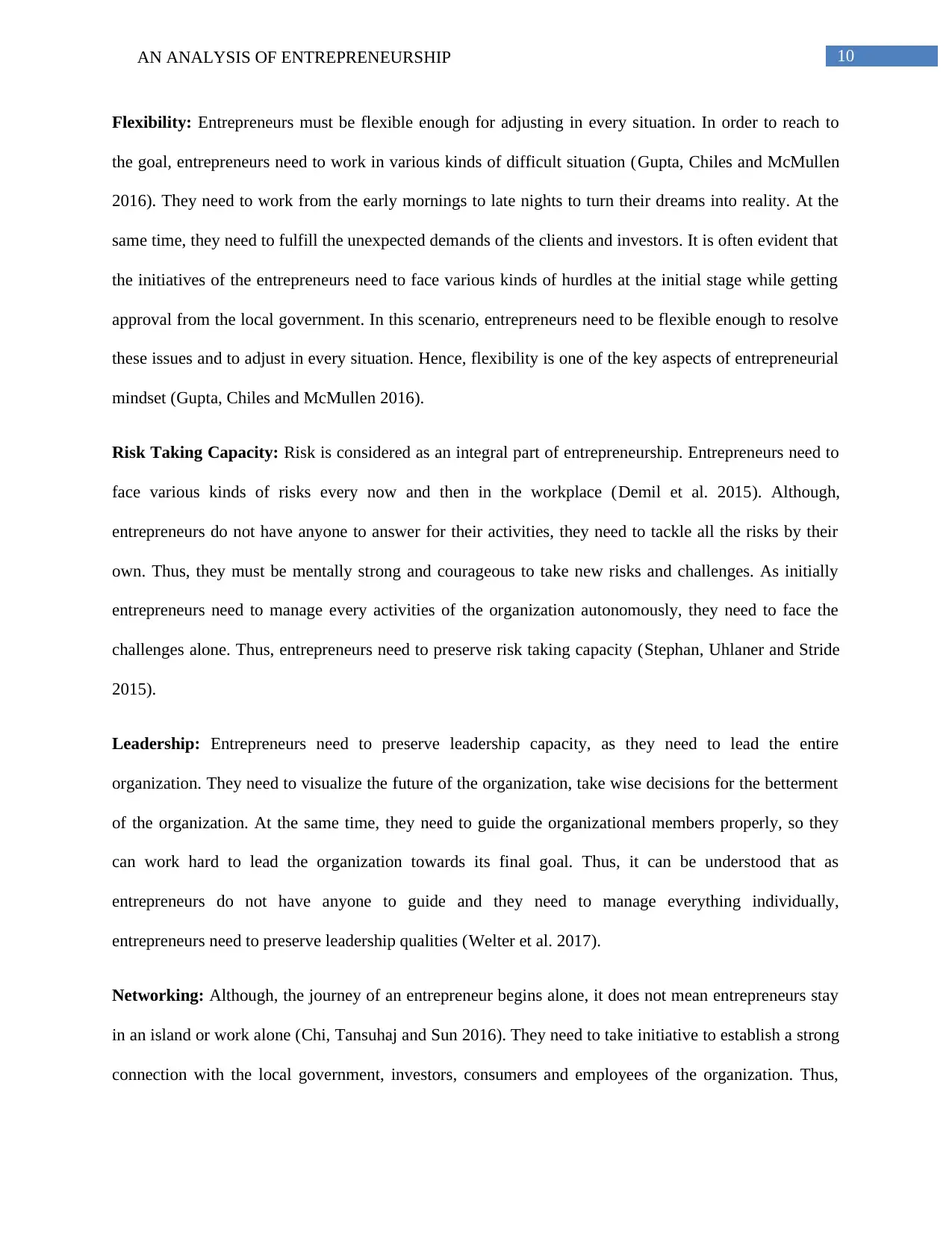
10AN ANALYSIS OF ENTREPRENEURSHIP
Flexibility: Entrepreneurs must be flexible enough for adjusting in every situation. In order to reach to
the goal, entrepreneurs need to work in various kinds of difficult situation (Gupta, Chiles and McMullen
2016). They need to work from the early mornings to late nights to turn their dreams into reality. At the
same time, they need to fulfill the unexpected demands of the clients and investors. It is often evident that
the initiatives of the entrepreneurs need to face various kinds of hurdles at the initial stage while getting
approval from the local government. In this scenario, entrepreneurs need to be flexible enough to resolve
these issues and to adjust in every situation. Hence, flexibility is one of the key aspects of entrepreneurial
mindset (Gupta, Chiles and McMullen 2016).
Risk Taking Capacity: Risk is considered as an integral part of entrepreneurship. Entrepreneurs need to
face various kinds of risks every now and then in the workplace (Demil et al. 2015). Although,
entrepreneurs do not have anyone to answer for their activities, they need to tackle all the risks by their
own. Thus, they must be mentally strong and courageous to take new risks and challenges. As initially
entrepreneurs need to manage every activities of the organization autonomously, they need to face the
challenges alone. Thus, entrepreneurs need to preserve risk taking capacity (Stephan, Uhlaner and Stride
2015).
Leadership: Entrepreneurs need to preserve leadership capacity, as they need to lead the entire
organization. They need to visualize the future of the organization, take wise decisions for the betterment
of the organization. At the same time, they need to guide the organizational members properly, so they
can work hard to lead the organization towards its final goal. Thus, it can be understood that as
entrepreneurs do not have anyone to guide and they need to manage everything individually,
entrepreneurs need to preserve leadership qualities (Welter et al. 2017).
Networking: Although, the journey of an entrepreneur begins alone, it does not mean entrepreneurs stay
in an island or work alone (Chi, Tansuhaj and Sun 2016). They need to take initiative to establish a strong
connection with the local government, investors, consumers and employees of the organization. Thus,
Flexibility: Entrepreneurs must be flexible enough for adjusting in every situation. In order to reach to
the goal, entrepreneurs need to work in various kinds of difficult situation (Gupta, Chiles and McMullen
2016). They need to work from the early mornings to late nights to turn their dreams into reality. At the
same time, they need to fulfill the unexpected demands of the clients and investors. It is often evident that
the initiatives of the entrepreneurs need to face various kinds of hurdles at the initial stage while getting
approval from the local government. In this scenario, entrepreneurs need to be flexible enough to resolve
these issues and to adjust in every situation. Hence, flexibility is one of the key aspects of entrepreneurial
mindset (Gupta, Chiles and McMullen 2016).
Risk Taking Capacity: Risk is considered as an integral part of entrepreneurship. Entrepreneurs need to
face various kinds of risks every now and then in the workplace (Demil et al. 2015). Although,
entrepreneurs do not have anyone to answer for their activities, they need to tackle all the risks by their
own. Thus, they must be mentally strong and courageous to take new risks and challenges. As initially
entrepreneurs need to manage every activities of the organization autonomously, they need to face the
challenges alone. Thus, entrepreneurs need to preserve risk taking capacity (Stephan, Uhlaner and Stride
2015).
Leadership: Entrepreneurs need to preserve leadership capacity, as they need to lead the entire
organization. They need to visualize the future of the organization, take wise decisions for the betterment
of the organization. At the same time, they need to guide the organizational members properly, so they
can work hard to lead the organization towards its final goal. Thus, it can be understood that as
entrepreneurs do not have anyone to guide and they need to manage everything individually,
entrepreneurs need to preserve leadership qualities (Welter et al. 2017).
Networking: Although, the journey of an entrepreneur begins alone, it does not mean entrepreneurs stay
in an island or work alone (Chi, Tansuhaj and Sun 2016). They need to take initiative to establish a strong
connection with the local government, investors, consumers and employees of the organization. Thus,
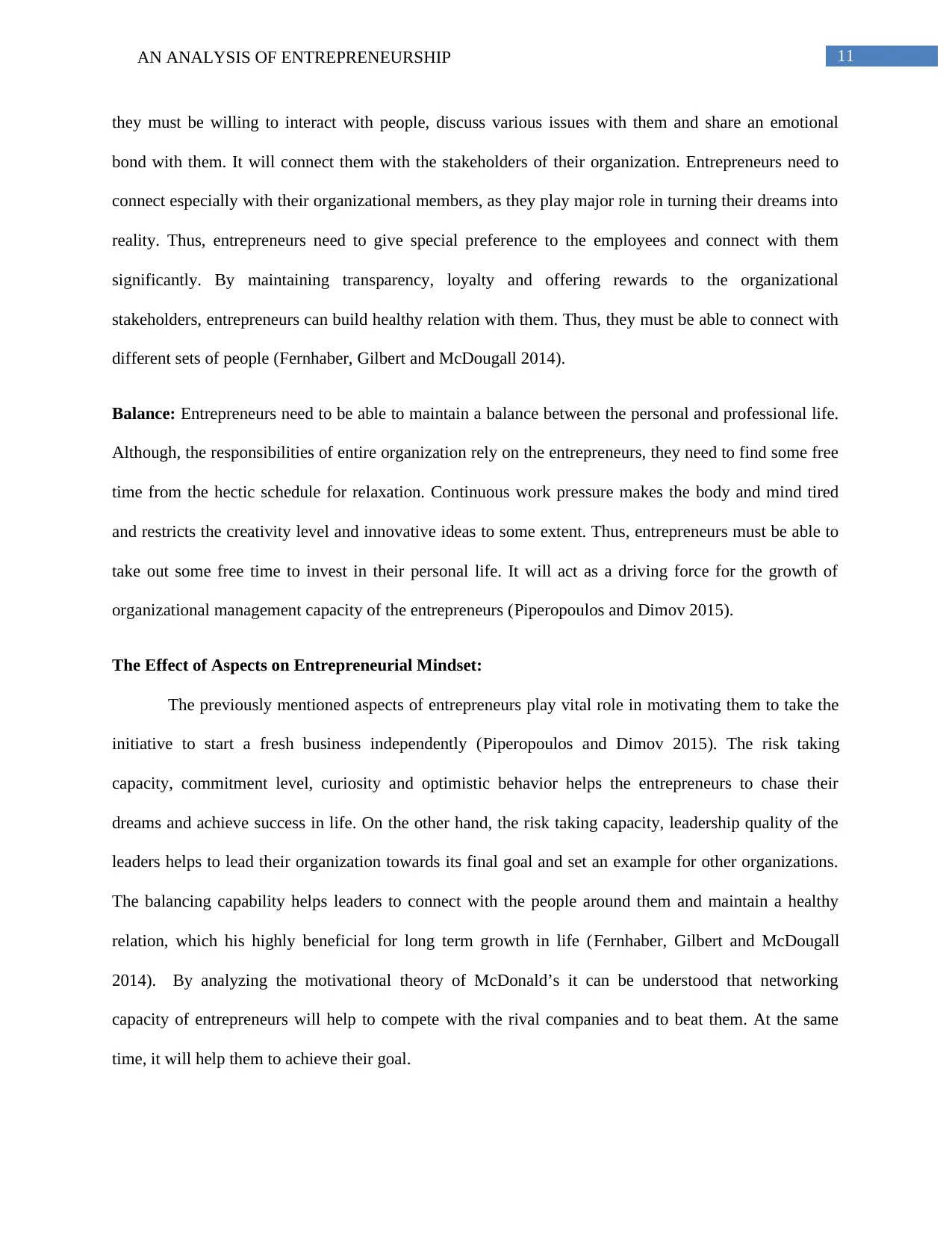
11AN ANALYSIS OF ENTREPRENEURSHIP
they must be willing to interact with people, discuss various issues with them and share an emotional
bond with them. It will connect them with the stakeholders of their organization. Entrepreneurs need to
connect especially with their organizational members, as they play major role in turning their dreams into
reality. Thus, entrepreneurs need to give special preference to the employees and connect with them
significantly. By maintaining transparency, loyalty and offering rewards to the organizational
stakeholders, entrepreneurs can build healthy relation with them. Thus, they must be able to connect with
different sets of people (Fernhaber, Gilbert and McDougall 2014).
Balance: Entrepreneurs need to be able to maintain a balance between the personal and professional life.
Although, the responsibilities of entire organization rely on the entrepreneurs, they need to find some free
time from the hectic schedule for relaxation. Continuous work pressure makes the body and mind tired
and restricts the creativity level and innovative ideas to some extent. Thus, entrepreneurs must be able to
take out some free time to invest in their personal life. It will act as a driving force for the growth of
organizational management capacity of the entrepreneurs (Piperopoulos and Dimov 2015).
The Effect of Aspects on Entrepreneurial Mindset:
The previously mentioned aspects of entrepreneurs play vital role in motivating them to take the
initiative to start a fresh business independently (Piperopoulos and Dimov 2015). The risk taking
capacity, commitment level, curiosity and optimistic behavior helps the entrepreneurs to chase their
dreams and achieve success in life. On the other hand, the risk taking capacity, leadership quality of the
leaders helps to lead their organization towards its final goal and set an example for other organizations.
The balancing capability helps leaders to connect with the people around them and maintain a healthy
relation, which his highly beneficial for long term growth in life (Fernhaber, Gilbert and McDougall
2014). By analyzing the motivational theory of McDonald’s it can be understood that networking
capacity of entrepreneurs will help to compete with the rival companies and to beat them. At the same
time, it will help them to achieve their goal.
they must be willing to interact with people, discuss various issues with them and share an emotional
bond with them. It will connect them with the stakeholders of their organization. Entrepreneurs need to
connect especially with their organizational members, as they play major role in turning their dreams into
reality. Thus, entrepreneurs need to give special preference to the employees and connect with them
significantly. By maintaining transparency, loyalty and offering rewards to the organizational
stakeholders, entrepreneurs can build healthy relation with them. Thus, they must be able to connect with
different sets of people (Fernhaber, Gilbert and McDougall 2014).
Balance: Entrepreneurs need to be able to maintain a balance between the personal and professional life.
Although, the responsibilities of entire organization rely on the entrepreneurs, they need to find some free
time from the hectic schedule for relaxation. Continuous work pressure makes the body and mind tired
and restricts the creativity level and innovative ideas to some extent. Thus, entrepreneurs must be able to
take out some free time to invest in their personal life. It will act as a driving force for the growth of
organizational management capacity of the entrepreneurs (Piperopoulos and Dimov 2015).
The Effect of Aspects on Entrepreneurial Mindset:
The previously mentioned aspects of entrepreneurs play vital role in motivating them to take the
initiative to start a fresh business independently (Piperopoulos and Dimov 2015). The risk taking
capacity, commitment level, curiosity and optimistic behavior helps the entrepreneurs to chase their
dreams and achieve success in life. On the other hand, the risk taking capacity, leadership quality of the
leaders helps to lead their organization towards its final goal and set an example for other organizations.
The balancing capability helps leaders to connect with the people around them and maintain a healthy
relation, which his highly beneficial for long term growth in life (Fernhaber, Gilbert and McDougall
2014). By analyzing the motivational theory of McDonald’s it can be understood that networking
capacity of entrepreneurs will help to compete with the rival companies and to beat them. At the same
time, it will help them to achieve their goal.
⊘ This is a preview!⊘
Do you want full access?
Subscribe today to unlock all pages.

Trusted by 1+ million students worldwide
1 out of 19
Related Documents
Your All-in-One AI-Powered Toolkit for Academic Success.
+13062052269
info@desklib.com
Available 24*7 on WhatsApp / Email
![[object Object]](/_next/static/media/star-bottom.7253800d.svg)
Unlock your academic potential
Copyright © 2020–2026 A2Z Services. All Rights Reserved. Developed and managed by ZUCOL.


